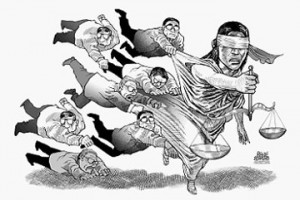
The reforms offer crucial changes. Witnesses would be allowed “free-flowing testimonies” and can speak their local language or dialect without the interruption or dilatory objections of lawyers. Courts have to start trials early or on time on pain of fines of P1,000 to P5,000 fines . Court cases have to be resolved in one sitting, unless complex issues are involved. And the verdict will be immediately announced after trial is over in open court, not left to sleep for ages on a judge’s desk.
While lawyers groups cautiously welcomed these changes, it was pointed out that shortened procedures may not suit criminal cases, where the accused, whose liberty is at stake, must have the benefit of a full cross-examination so his legal counsel can grill the accuser.
A basic requirement for speedy justice is having enough judges to do the job, and court houses to work in. In Cebu, several vacancies in the bench remain unfilled.
Clogged court dockets have to be addressed by matching the workload with the workforce.
Can the Supreme Court do that pronto? The remedy entails a big expense, which the country’s judiciary struggles to do with the miniscule budget they receive from Congress although generous monthly allowances have been granted by the Capitol and City Hall.
During the impeachment trial in the Senate, the public has seen how high caliber lawyers like former justice Serafin Cuevas, manage to delay the proceedings through persistent objections that can be entertained by the judge to the detriment of the case.
The proposed changes laid down by the Supreme Court stand to benefit litigants, both complainants and respondents of cases.
The public has been long suffering countless delays in the delivery of justice.
As Associate Justice Roberto Abad announced in his dialog with Cebu law practitioners the other day, a change of attitude is what is most required, an open mind towards doing things differently.
“Our system for hearing and deciding cases is no longer working for us,” he said.
His appeal was directed at lawyers, prosecutors and judges who are in the frontlines of the administration of justice.
It’s good to hear that Cebu will be a pilot area for these reforms.
It’s time for the courts to tighten the rules of engagement and eliminate delaying tactics.